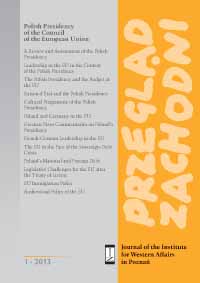Legislative Challenges for the European Union after the Treaty of Lisbon Entered into Force
Legislative Challenges for the European Union after the Treaty of Lisbon Entered into Force
Author(s): Adam KirpszaSubject(s): Politics / Political Sciences
Published by: Instytut Zachodni im. Zygmunta Wojciechowskiego
Summary/Abstract: The purpose of the article is to identify the legislative challenges of the European Union that became apparent after implementation of the Treaty of Lisbon provisions. At least six such threats are diagnosed. Firstly, the Treaty of Lisbon has deepened the European Parliament legislative exclusion by increasing the number of areas where it does not have any formal powers. Secondly, more than half of the Treaty bases for enacting legislation includes procedures other than the ordinary legislative procedure which relatively weakens the position of the Parliament. Thirdly, the habit of trilogues – informal meetings between the Council, Commission and Parliament in the early stages of the legislative procedure generates serious consequences for the status of institutions and democracy in the EU. Fourthly, the custom of so-called early agreements results in almost complete disappearance of the second and third reading and quickens the decision-making process at the expense of its transparency. Fifthly, trilogues and early agreements degraded the role of the European Parliament’s committees in legislative proceedings. Finally, there is a declining involvement of ministers in the legislative process, resulting in technocratic and secret decision making.
Journal: Przegląd Zachodni
- Issue Year: 349/2013
- Issue No: I ENG
- Page Range: 185-209
- Page Count: 25
- Language: English

